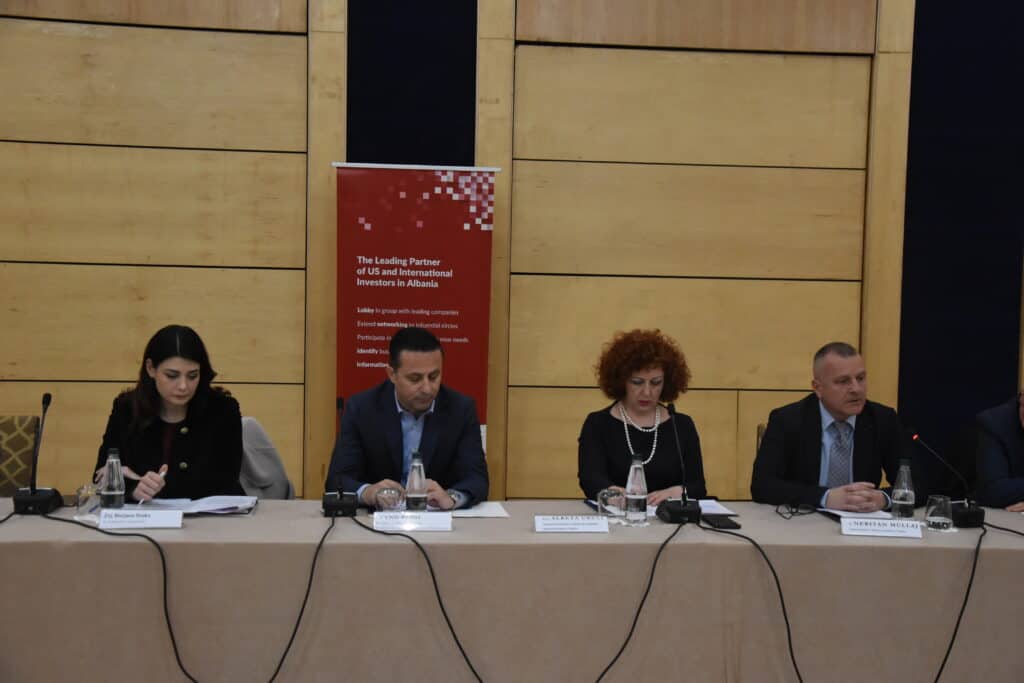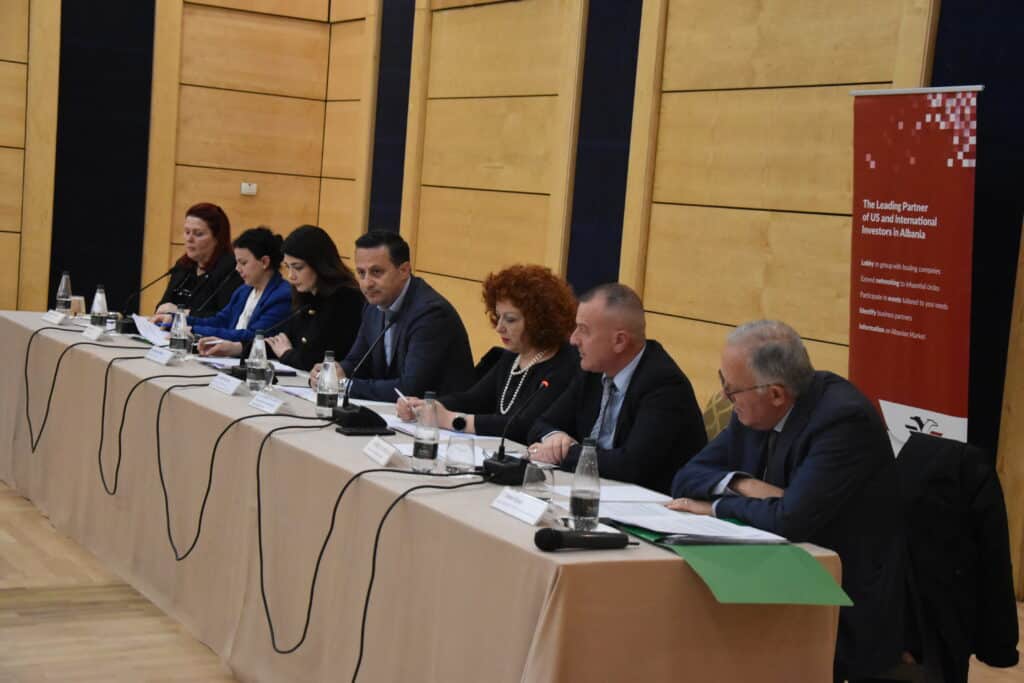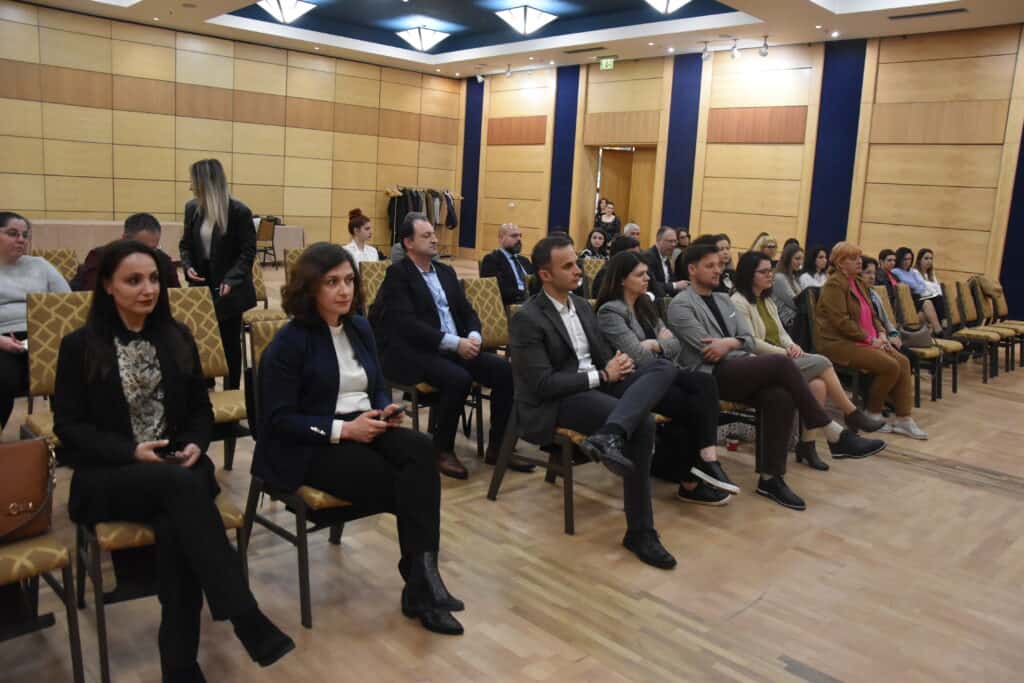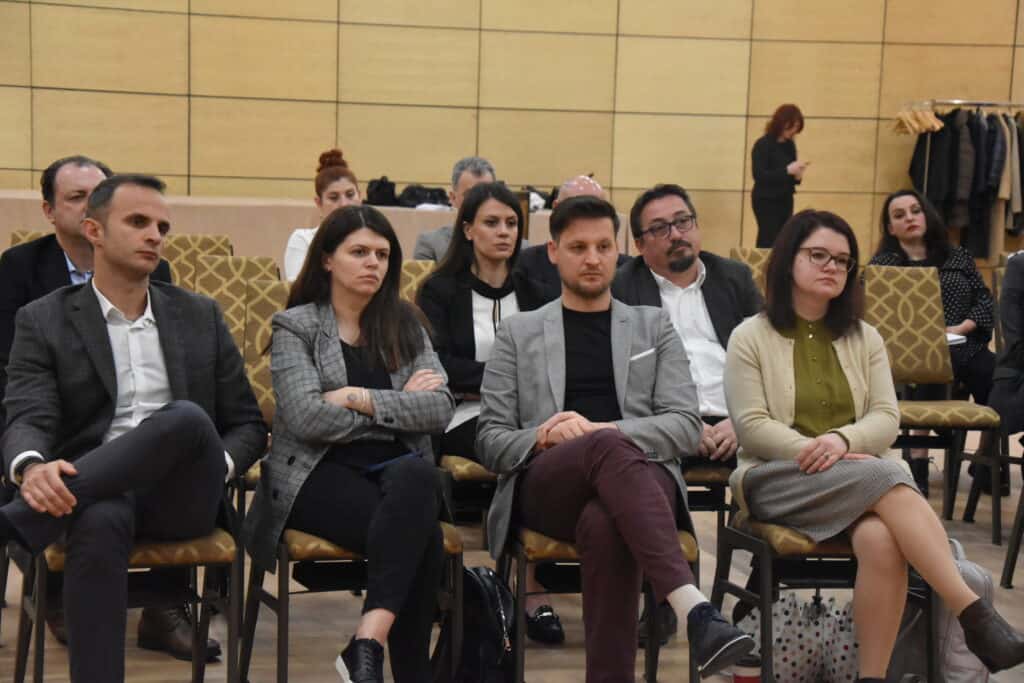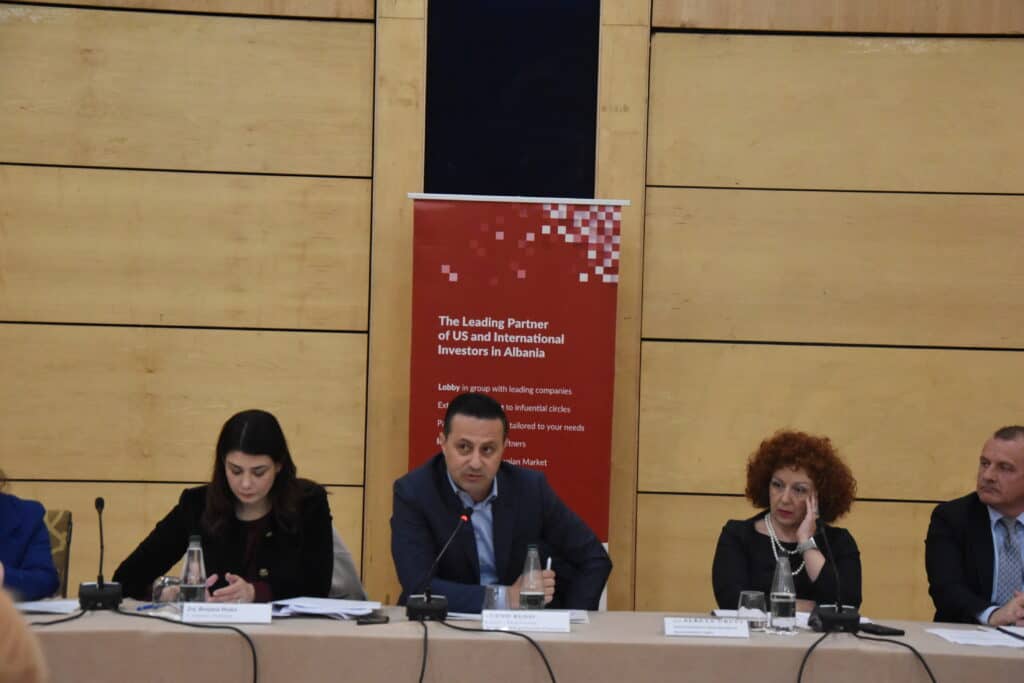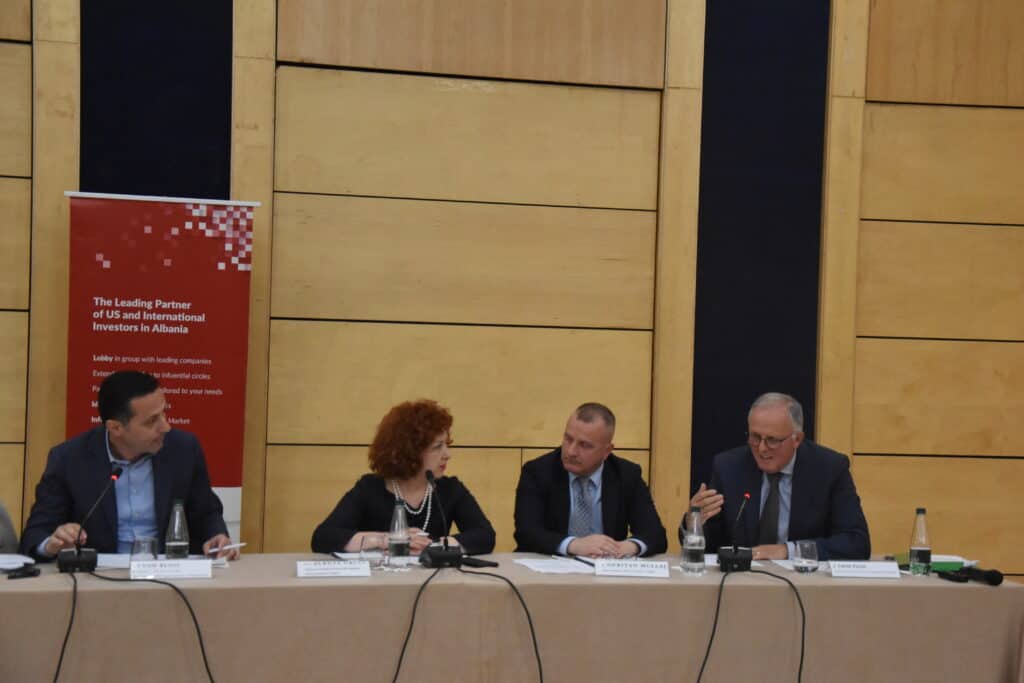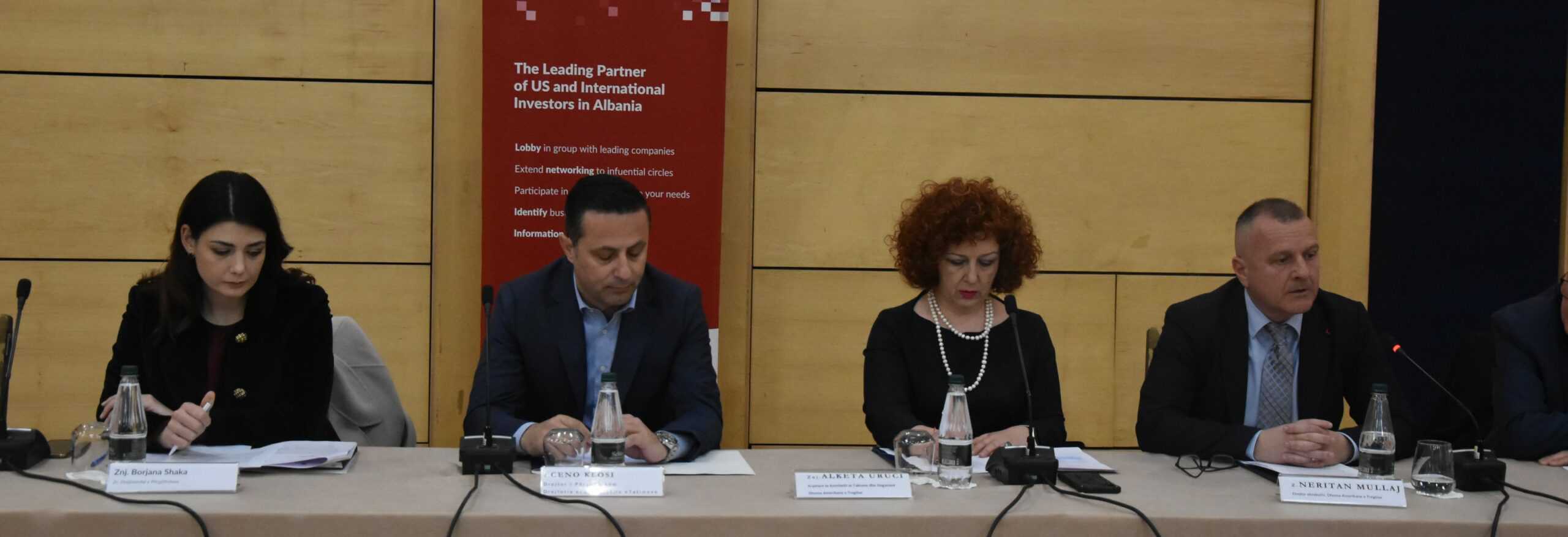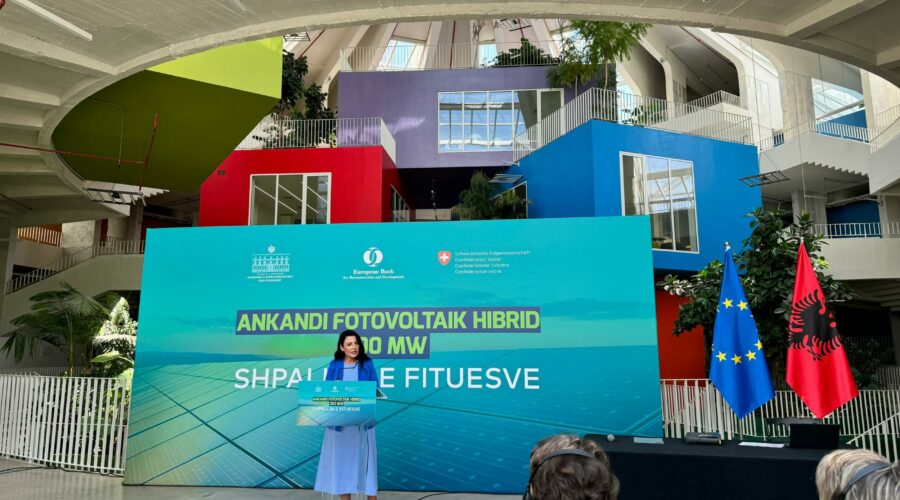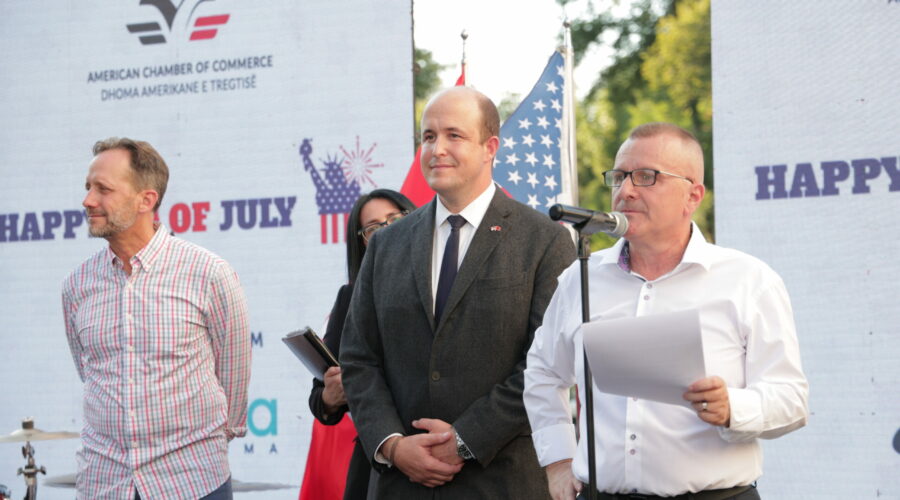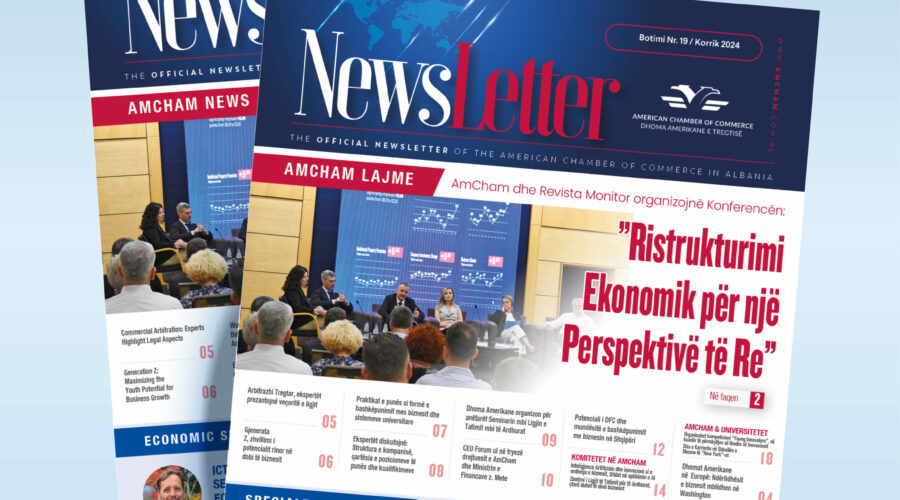AmCham Albania’s Tax and Customs Committee held a meeting with the head of the General Directorate of Taxation (GDT), Ceno Klosi, and his staff to discuss the practical effects of the implementation of guidelines on tax agreements that aim to eliminate double taxation. AmCham Albania Executive Director Neritan Mullaj said the meeting with Mr. Klosi was appreciated as a good opportunity to address with the head of the institution issues that businesses encounter with the implementation of guidelines on these agreements. Mr. Mullaj emphasized that it would be important in terms of institutional communication and dialogue if Ministry of Finance (MoF) representatives were also present at the discussion table, as it is the ministry that drafts the guidelines that have caused issues during implementation.
Experts from both sides spoke about concrete issues arising from the guidelines, the implementation of which in practice has led to many problems in recent years. Issues discussed included unnecessary bureaucracy in the submission of documentation to certify transactions with countries that have tax agreements in place, the time limit for their submission, the lack of online procedures, the need for a digitized archive and tax employees lacking competence in handling cases.
The two institutions’ experts exchanged views on the issues of concern and found agreement on some of them. They also agreed the discussion should be expanded to include the Ministry of Finance as it regulates issues that are beyond the institutional scope of GDT by issuing guidelines.
Issues pointed out by businesses
Alketa Uruçi, chairwoman of the Tax and Customs Committee, listed some of the problems AmCham member businesses encounter during the practical implementation of the guidelines. They pointed out to unnecessary bureaucratic measures, which include: requiring a SWIFT transfer document with an original stamp when a payment is made, or contracts that have been signed and already delivered, filing of translated and notarized documents, police certifications for the physical presence of foreign employees, and the rejection of unsigned or unstamped invoices from foreign suppliers.
The Ministry of Finance guideline sets a two-year deadline for the application process, starting from the moment of payment of the invoice. But the guideline cannot overrule the tax agreement, which has the status of international agreement and as such supersede domestic law and MoF guidelines.
One of the tax committee experts, Fatmir Kazazi, highlighted that it is necessary to interpret the guidelines in the spirit of the elimination of double taxation and to evolve with the way business is now being done for a decade through the use of electronic documents, as well as to make proposals for improvements so that the guidelines don’t prevent the implementation of agreements. Thus, the MoF guideline cannot compel Albanian subjects to ask their counterparts in Europe to change documentation methods to adapt to Albanian law and tax authorities cannot extend their jurisdiction outside Albania. It is impossible for Albanian subjects to ask their business partners to change the way they issue residence certificates or invoices, while tax authorities simply need to prove whether the invoice has really been paid.
Frequent changes in the tax administration further complicate the situation by making interpretations that conflict with the law as you cannot create tax liabilities that do not exist simply due to the fact that supporting documents have been filed late. It is true that the MoF guideline foresees a two-year deadline for the submission of some documents, but for irregularities in the documentation or delays, a fine could be imposed for not completing the procedure on time. But the application of the agreement cannot be rejected because the tax agreements do not provide for a time limit when the application is made and when the agreement is implemented.
It is unacceptable and not based on the agreements and the law to deny implementation of an international agreement as a result of an administrative delay in the submission of some documents, mostly caused by delays from foreign partners and foreign tax authorities, but also by delays at GDT itself.
AmCham’s tax committee experts were of the opinion that many of the bureaucratic procedures encountered in implementation can be solved through an official position of the GDT regarding the unification and simplification of the procedure.
The AmCham Tax and Customs Committee and Mr. Klosi agreed that they will work together to simplify the existing procedures and to draft a new guideline on such agreements that matches the latest developments related to the digitization of the tax administration in general — both in Albania and in the countries of business partners — enabling taxpayers to electronically upload the necessary documentation (contracts, residence certificates) in accordance with the provisions of tax agreements.
Following up on agreed issues
GDT Director Ceno Klositold present AmCham members and tax committee experts that he admits there are problems with the implementation of the guidelines, including delays in returning answers, but many problems are beyond the scope of the GDT and require the intervention of the Ministry of Finance. Being the implementer of the guidelines, GDT and its staff have to be careful with the rigorous implementation and not allow any avenues for misinterpretations.
Members of the AmCham Tax and Customs Committee and representatives of the largest taxpayers in the country insisted that the deadline set by the guideline does not provide for “non-recognition of expenses” or “non-implementation of the agreement.” That is not only not foreseen in the guideline, but the guideline can never define a tax liability that does not exist in the agreement.
Committee experts and GDT representatives also discussed the decisions of the Directorate of Tax Appeals and the necessity that the approach of GDT for non-recognition of expenses or non-implementation of the agreement due to an administrative delay must end, in such a way that do not create endless administrative costs for taxpayers, tax authorities and courts. Under these conditions, it is clear that the only fines that can be applied would be those for not keeping proper documentation records as per the Law on Tax Procedures.
“We do not interpret the guidelines. The guideline sets clear definitions, and we are obliged to return an answer based on the guideline when the subject applies after the two-year period has expired. We cannot violate the guidelines, because we are law enforcers,” Mr. Klosi said.
He added that the entire process is manual and every time a request is made, employees must go back to look at the history of the file. The lack of accurate documentation, but also the professional level of the administration have created their own problems too.
Mr. Klosi agreed that there is a need for a digitized process to avoid not only mistakes but also abuses. In the new structure of the tax administration, a special directorate has been proposed to deal just with the implementation of double taxation agreements, which includes the establishment of a call center to have more direct communication with taxpayers. A digital archive will also be able to serve the new entity.
According to Mr. Klosi, GDT would welcome the amendment of the guideline by transferring the implementation of tax agreements to regional directorates, thus removing a burden from GDT so it can focus on processes related to the development and improvement of the tax environment and tax collection.
GDT and AmCham will follow up on the issues that were agreed upon and propose concrete standard practices as well as work with the Ministry of Finance to see the possibility of changing the guideline.
Marrëveshjet për tatimin e dyfishtë ulin në tryezën e dialogut AmCham dhe DPT
Komiteti i Taksave dhe Doganave në AmCham është takuar me Drejtorin e Përgjithshëm të Tatimeve z. Ceno Klosi dhe stafin e tij për të diskutuar mbi efektet në praktikë të zbatimit të udhëzimit mbi Marrëveshjet Tatimore për eleminimin e tatimit të dyfishte. Drejtori i AmCham Albania Neritan Mullaj ka vlerësuar prezencën e z. Klosi si një mundësi e mirë për të trajtuar me titullarin e institucionit cështje që biznesi has në praktikat e tij me zbatimin e udhëzimit. Z. Mullaj theksoi se ishte e rëndësishme në funksion të komunikimit institucional dhe dialogut, që në këtë tryezë diskutimesh të ishte edhe prezenca e përfaqësuesve të Ministrisë së Financave të cilët janë hartuesit e udhëzimit që ka sjellë problematikat e veta gjatë implementimit.
Ekspertët e të dy institucioneve kanë folur mbi cështje konkrete që vijnë nga udhëzimi, zbatimi në praktikë i të cilit ka reflektuar mjaft probleme në vitet e fundit. Burokracitë e panevojshme në dorëzimin e dokumentacioneve për të vërtetuar transaksione me vendet që kanë në funksion marrëveshjet tatimore, afati kohor i dorëzimit të tyre, mungesa e procedurave online, një arkive digjitalizuese dhe mungesa e kompetencës së punonjësve tatimorë në trajtimin e cështjeve, kanë qënë në fokus të diskutimit.
Ekspertët e të dy institucioneve kanë shkëmbyer argumentat mbi cështjet e ngritura dhe kanë dakortësuar për disa prej tyre. Është rënë dakord gjithashtu që diskutimi të zgjerohet edhe me Ministrinë e Financave për të rregulluar përmes udhëzimit cështje që janë përtej tagrit institucional të tatimeve.
Problematikat e vëna re nga biznesi
Alketa Uruçi, Kryetare e Komitetit të Taksave dhe Doganave ka renditur disa nga problemet që bizneset anëtare të AmCham ndeshin gjatë zbatimit në praktikë të udhëzimit. Kërkimi i swiftit me vulë origjinale kur bëhet një pagesë, apo kontrata të cilat janë lidhur dhe janë dorëzuar njëherë, depozitimi i dokumentave të përkthyera dhe të noterizuara, vërtetime nga policia për praninë fizike të punonjësve të huaj, refuzimi i faturave të panënshkruara ose të pavulosura nga furnitorët e huaj, janë konsideruar si masa burokratike të panevojshme.
Udhëzimi i Ministrisë së Financave cakton një afat dyvjeçar nga momenti i pagimit të faturës për procesin e aplikimit. Por ky udhëzim nuk prevalon dot mbi marrëveshjen tatimore të cilat kane statusin e marrëveshjeve ndërkombëtare dhe si të tilla janë mbi ligjin e brendshëm dhe udhëzimet e Ministrisë së Financave.
Një nga ekspertët e Komitetit të Taksave z. Fatmir Kazazi ka sjellë në vëmendje se është e nevojshme që udhëzimi të interpretohet në frymën e eleminimit të tatimeve të dyfishta dhe zhvillimet e mënyrës së të bërit biznes në dhjetëvjecarin e fundit nëpërmjet përdorimit të dokumentave elektronike si dhe të bëhen propozime për përmirësime në mënyrë që udhëzimi të mos pengojë zbatimin e marrëveshjeve. Kështu, udhëzimi nuk mund t’i detyrojë subjektet shqiptare të kërkojnë nga homologët e tyre në Europë të ndryshojnë dokumentacion që t’i përshtaten ligjit shqiptar dhe tatimet nuk mund të ushtrojnë juridiksion jashtë Shqipërisë. Është e pamundur që subjektet shqiptare t’i kërkojnë partnerëve të tyre të biznesit se si të bëjnë certifikatat e rezidencës apo faturat, ndërkohë që tatimet thjesht duhet të vërtetojnë nëse është paguar vërtet fatura.
Ndryshimet e herëpashershme në administratën tatimore e rëndojnë dhe më shumë situatën duke bërë interpretime që bien ndesh me ligjin pasi nuk mund të krijosh detyrime tatimore që nuk ekzistojnë vetëm për faktin se janë dorëzuar me vonesë disa dokumentacione mbështetëse. Eshtё e vёrtetё qё nё Udhёzimin e Ministrit tё Financave parashikohet njё afat 2 vjecar pёr paraqitjen e disa dokumentave, por, pёr parregullsi nё dokumentacion ose vonesa mund të vendosej një gjobë për mos kryerjen e procedurës në kohë por nuk mund të refuzohet aplikimi i marreveshjes sepse marrëveshjet tatimore nuk parashikojne afat kohor kur bëhet aplikimi dhe kur zbatohet marrëveshja.
Eshtё e pa pranueshme dhe e pa bazuar nё Marrёveshje dhe nё Ligj, qё, pёr shkak tё njё vonese administrative nё paraqitjen e disa dokumentave, e shkaktuar mё sё shumti nga vonesat nga partnerёt e huaj dhe autoritetet e huaja tatimore, por edhe nga vonesat e Drejtorisё sё Pёrgjithёshme tё Tatimeve (DPT), tё mohoet zbatimi i Marrёveshjes.
Ekspertët e Komitetit të Taksave kanë qenë të mendimit se shumë nga burokracitë e hasura në praktikë janë të zgjidhshme nëpërmjet një qëndrimi zyrtar të DPT në lidhje me njehsimin dhe lehtësimin e procedurës.
Komiteti i Taksave dhe Z. Klosi ranё dakort se do tё bashkёpunojnё fillimisht pёr tё thjeshtuar procedurat ekzistuese dhe mё tej pёr hartimin e njё Udhёzimi tё ri pёr Marrёveshjet qё ti pёrgjigjet zhvillimeve tё fundit lidhur me dixhitalizimin e administrimit tatimor nё pёrgjithёsi nё Shqipёri dhe nё vendet partnere dhe ti mundёsojё tatimpaguesve ngarkimin elektronik tё dokumentacionit tё nevojshёm (kontrata, çertifikata rezidence) nё pёrputhje me dispozitat e marrёveshjeve tatimore.
Ndjekje mbi cështjet e dakordësuara
Drejtori i DPT Ceno Klosiduke folur me anëtarët e AmCham dhe ekspertët e Komitetit të Taksave ka pranuar se ka probleme të zbatimit të udhëzimit, përfshirë vonesat në kthimin e përgjigjeve por shumë problematika janë përtej tagrit të DPT dhe kanë nevojë për ndërhyrjen e Ministrisë së Financave. Duke qënë zbatues të udhëzimit, DPT duhet të ketë kujdes me stafet e veta në zbatimin rigoroz dhe mos lënien shteg të keqinterpretimeve.
Anёtarёt e Komitetit tё Taksave dhe pёrfaqёsues tё tatimpaguesve mё mёdhenj nё vend insistuan se afati i pёrcaktuar me Udhёzim nuk parashikon “mosnjohje shpenzimesh” apo “mos-zbatim tё marrёveshjes. Kjo jo vetёm qё nuk parashikohet nё Udhёzim, por nuk mundet kurrsesi qё Udhёzimi tё pёrcaktojё njё detyrim tatimor qё nuk ekziston nё Marrёveshje.
Ekspertёt e Komitetit tё Taksave dhe pёrfaqёsuesit e DPT diskutuan edhe pёr vendimet e Drejtorisё sё Apelimit Tatimor dhe domosdoshmёrinё qё qasja e DPT pёr mos-njohjen e shpenzimeve apo mos zbatimin e marrёveshjes pёr shkak tё njё vonese administrative duhet tё marrё fund, nё mёnyrё qё tё mos krijohen kosto administrative pa fund pёr tatimpaguesit, organet tatimore dhe gjykatat. Nё kёto kushte ёshtё e qartё se mund tё aplikohet vetёm gjoba pёr mos-mbajtje tё rregullt dokumentacioni sipas Ligjit pёr Procedurat Tatimore.
“Ne nuk e interpretojmë udhëzimin. Udhëzimi e përcakton qartë dhe ne jemi të detyruar të kthejmë një përgjigje mbështetur në Udhëzim, kur subjekti aplikon pasi ka mbaruar afati dy vjecar. Nuk mund të shkelim udhëzimin sepse ne jemi ligjzbatues”- u shpreh z.Klosi.
Sipas z. Klosi procesi është manual dhe sa herë që bëhet një kërkesë punonjësit duhet t’i rikthehen praktikës. Mungesa e dokumentacionit të saktë por edhe niveli profesional i administratës ka sjellë problematikat e veta.
Z. Klosi ka rënë dakord se ka nevojë për një proces të digjitalizuar për të evituar jo vetëm gabimet por dhe abuzimet. Në strukturën e re të administratës tatimore është propozuar një Drejtori e Posacme vetëm për zbatimin e marrëveshjeve për tatimin e dyfishtë ku përfshihet dhe ngritja e një call center për të patur një komunikim më të drejtpërdrejtë. Në funksion të saj do të jetë dhe arkiva digjitale.
Sipas z. Klosi, DPT do ta mirëpriste ndryshimin e Udhezimit duke e kaluar zbatimin e marrëveshjeve tatimore pranë drejtorive rajonale duke i hequr kështu një barrë DPT për t’u fokusuar në procese në lidhje me zhvillimin dhe përmirësimin e mbledhjes së tatimeve dhe taksave.
Sipas z. Klosi, DPT do ta mirepriste ndryshimin e Udhezimit duke e kaluar zbatimin e marreveshjeve tatimore prane drejtorive rajonale duke i hequr keshtu nje barre DPT per t’u fokusuar ne procese ne lidhje me zhvillimin dhe permiresimin e mbledhjes se tatimeve dhe taksave.
DPT dhe AmCham do të ndjekin cështjet për të cilat u ra dakord dhe të propozohen praktika standarte konkrete si dhe të punohet me Ministrinë e Financave për të parë mundësinë e ndryshimit të udhëzimit.
